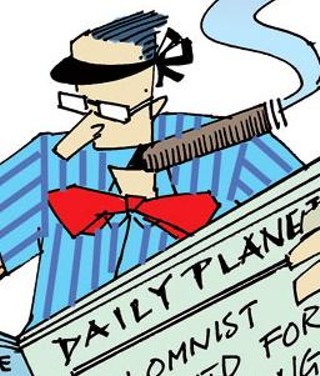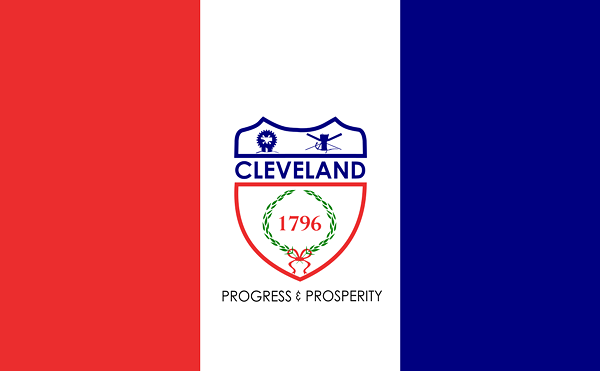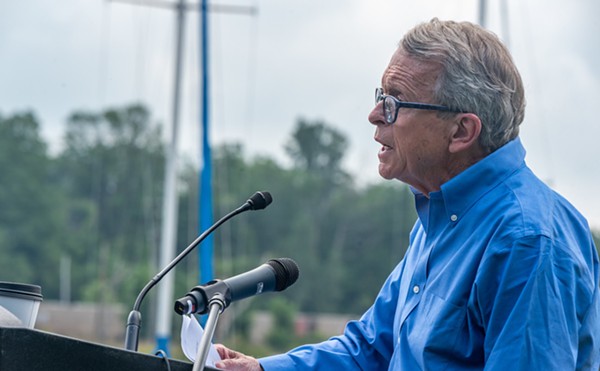Journalist and author Jim Krane grew up in Lakewood and played in some Akron garage and punk bands (Starvation Army, Jippo and Squelch) in the '80s before moving to New York. His career with the Associated Press took him to the Middle East, covering Baghdad, then all six Gulf Arab nations, including the United Arab Emirates and Dubai. Today he lives in England with his family, and that's where we caught up with him, via e-mail, to discuss his new book, City of Gold: Dubai and the Dream of Capitalism (St. Martin's Press).
I was born at the Cleveland Clinic in 1964. I grew up in Lakewood, on Giel Avenue mainly. I went to St. Luke's School until reaching 5th grade in 1974, when my parents split up and my mom took us kids to live in Connecticut. My dad stayed in Lakewood.
I returned to Lakewood after graduating from high school in Connecticut. My dad gave me a rent-free apartment in his building on Atkins Avenue in return for my handling of the superintendent duties. I had just turned 18 and was clueless about fixing things, but I gave it a shot. There's a brief anecdote in the Dubai book that refers to this period, in the summer of 1982, when I was clambering to the top of a rickety extension ladder to scrape and paint the gutters on Atkins:
When I was a teenager, my dad put me to work painting the gutters on his apartment building in Cleveland. I climbed up a 40-foot extension ladder to get there, a bit over three stories high. It was scary. I got used to it. But I've never been comfortable up high. I understand how people get acrophobia, the urge to jump. So I was worried when my request to visit the top of the Burj Dubai was approved in the summer of 2007. The tower had just hit 141 stories, but it was a concrete skeleton, open on all sides. I phoned the guy at Emaar [the developer] who was supposed to escort me to the summit.
"You're not afraid of heights by any chance?" he asks. He's got a thick New York accent.
"I've never been that high so I can't guarantee it," I tell him. "Why? Have you had problems?"
"Oh yeah," he tells me. "Saturday we had an incident. Some people just can't help themselves when they get up that high. They feel like throwing themselves off. They get these thoughts in their heads, like 'I'm going to end it right now!' And they're otherwise normal people."
He tells me how he grappled with a woman visitor who, soon after reaching the top, tried to leap to her death. "It was a real struggle to get her down."
"I think they call it vertigo," I said.
"So tell me," he says. "Are you a big guy? Reason I ask is because I could chain you to me. That way, if you get a crazy idea, I can bring you back."
"I'm about six-foot-one," I tell him.
"Oh, forget it," he shouts. "You'd take me with you!"
He mumbles something about checking on permits for my visit and hangs up. Thankfully, I never hear from him again. My visit to the exposed top of the Burj Dubai never happens. Maybe it's a good thing.
I moved to Akron and spent the recession winter of 1982-83 there, trying and failing to find a job. I came back to Cleveland and occupied a quick succession of dumpy apartments. I lived in two houses on East 31st Street, just off Superior; then moved into a small flat on Columbus Avenue in the Flats; then shifted into Tremont, starting on Starkweather Avenue and then two separate places on Fairfield, renting from Keith Brown (before he started PURE[Progressive Urban Real Estate]) and living next to novelist Mike DeCapite. I could hear Mike pounding away on his typewriter whenever I was in the bathroom. In the summer of 1986, I left town for a yearlong trip around the world — departing with just $600 — and didn't come back for 10 months. When I returned, I found an apartment in an old walkup across the street from The Plain Dealer at 19th and Superior, next to the Tower Press building.
I played in some of Cleveland's garage and punk bands in the '80s: Starvation Army, Jippo and Squelch; used to spend a lot of time at a bar called the Lakefront on West 9th Street, and also hung out at the old 2300 Club on Payne, and the Agora, the Pop Shop, Cleveland Underground and the bars around Tremont. Squelch had a periodic gig at a go-go bar called Bugsy's Speakeasy on West 25th Street. We split alternating sets with the go-go girls. It was a surprisingly seamless operation.
I started college at Tri-C's Metro campus and then transferred to Cleveland State, where I hung out with my uncle, Jim Werle, who was studying engineering, and Plain Dealer columnist John Petkovic, who was then infatuated with his Bible as Literature class. In 1988 I moved to New York, into a building full of Clevelanders, including DeCapite. I wound up graduating from City College of New York — nine years after starting my degree. I moved to Texas briefly, but spent most of the next 15 years in New York or just across the river in Jersey City. But I still consider Cleveland my hometown. Always will.
How and when did you first arrive in Dubai? How long did you live there?
I first visited Dubai in 2004 with my girlfriend, now wife, Chloe. I was living in Baghdad at the time, working as a correspondent for the Associated Press. It was six weeks in, two weeks out. I met up with Chloe for most of my two-week breaks. Once, we went to Sri Lanka and stayed at a friend's beach house. On the way back to Baghdad (me) and London (Chloe) decided to spend a night in Dubai. We'd heard the hype and wanted to see whether the city lived up to its reputation. Neither of us were impressed. Dubai was stiflingly humid — worse than Baghdad — and the streets in the city center were gridlocked and charmless. The whole place seemed designed to intimidate pedestrians. We couldn't figure out what the hype about this "Las Vegas in the Gulf" was all about.
A few months later, my editor at AP informed me that my next assignment would be in Dubai. "The pearl of the Middle East," she described it. I told her I didn't care much for Dubai. Was there anyplace else I could go? She widened the options: I could have Dubai or Caracas. So we took Dubai.
For an American, what about the city feels familiar, and what is jarring?
After Baghdad, Dubai was more familiar than jarring. It's a modern city with broad highways, sparkling skyscrapers and huge tracts of suburban housing. You can eat substandard ribs at Tony Roma's, pick up a six pack at the liquor store and grill your German bratwursts on the backyard barbecue. Dubai looks a lot like Phoenix or Las Vegas, but with a very nice beach.
But there are plenty of reminders that you're not in the U.S.A. anymore. There are outdoor Iranian kebab restaurants with reclining groups smoking bubbling waterpipes, gushing cherry- and apple-scented smoke. There are teeming immigrant streets smelling of curry and the sharp musky smell of oud incense in the malls, where the local Arabs parade in their distinctive dress: the men in immaculate starched gowns so white they are slightly blue, and the contrasting black abayas of the women, looking graceful and attractive in dresses meant to be modest.
What is different about the United Arab Emirates from, say, Saudi Arabia, another nation whose wealth comes mostly from the West, that makes the rapid rise of a city like Dubai possible?
Well, first off, I should point out that Dubai's wealth doesn't come mostly from the West — at least not right away. Since Dubai doesn't have much in the way of oil, the city makes its money through trade, shipping, financial services, tourism and, until recently, construction and real estate. That said, a lot of the money invested in Dubai comes from the surrounding oil states. That makes Dubai the largest physical manifestation of last year's $4 gas.
Dubai is vastly different from Saudi Arabia. Both were very primitive and nearly empty until recently. In Dubai's case, the primitive days are even more recent. But Saudi Arabia is stifling — and I don't mean the weather. To westerners, especially, the place just feels oppressive, with forced piety and tragic segregation of the sexes. The atmosphere feels wrong. By comparison, Dubai basks in a heady freedom, even though the government is as undemocratic as they get. The city is tolerant and open, with bars and brothels, mosques and temples and churches, and beaches thronged with women in bikinis next to others covered head to toe in black.
What's it like to visit the Palms [palm-tree-shaped man-made islands packed with expensive homes and hotels]?
The Palm Jumeirah is the only one of the three Palm islands that is yet open. Visiting it is a non-event. In fact, driving up the "trunk" of the Palm, you rarely even get a view of the sea. The land was so expensive to reclaim that every square inch of it is built upon. You'd be forgiven for not realizing you were on an island. Each of the 17 "fronds" leading off from the main trunk is a single dead-end street lined with blocky McMansions jammed as tight as teeth in a set of dentures. The gargantuan pink Atlantis resort at the far end is an arresting sight, the interior done in undersea themes of starfish and shell bas-reliefs, and giant fish tanks swarming with sharks.
You write about the stratification of the city, with abject poverty amidst the staggering wealth, even sex slavery. Do the wealthy inhabitants and visitors ever see this? Do they care?
Yes, Dubai is extremely stratified, about as stratified as is humanly possible, with some of the world's richest people living just blocks away from some of its poorest. No, wealthy Dubaians don't usually venture into the labor camps, where the poorest immigrant workers live in their ramshackle dormitories. But that said, wealthy people in the Cleveland suburbs don't usually spend a lot of time in the city's poorest ghettos. And the poverty in Dubai isn't the grinding urban malaise you see in Cleveland, with the despair, unemployment and the violent subculture. Dubai's poor have jobs. There is very little crime. But the workers, mainly young men who've left their families in their home countries, work in extremely harsh conditions for nearly nothing. The men responsible for building a city that claims ostentation as its brand are not much better off than slaves.
You write that Dubai was built in "the earth's most barren landscape" on the concept of "hotel as destination." So it's tempting to think of the city as the Vegas of the Middle East. Would that be accurate? Has it become popular among American celebrities?
Yes, it's Las Vegas on steroids, without the gambling, but with twice the hookers. American celebrities do breeze through from time to time. Paris Hilton just shot a TV series in Dubai. Tiger Woods designed a golf course and Brad Pitt was designing a resort hotel, but it appears both of those projects were canceled.
You note that the UAE is an American ally and viewed in Washington as "the anti-Iran." Is that sound reasoning, or naïve?
You're asking me whether I'm naïve? Let me explain: Dubai and the UAE is viewed as the anti-Iran in the context in which I placed it in my book. Washington (belatedly) wants to support Dubai's social freedoms and religious tolerance as an antidote to Iran's intolerance and lack of those freedoms. They hope the region ultimately adopts the "Dubai way" rather than the "Iran way." This is one reason why the Bush and Obama administrations gave support to the UAE's nuclear-power program. They pointed out that the UAE went about developing its nuclear program in a transparent fashion, swearing off the enrichment process and working hand-in-hand with the United Nations. In this way, also, Dubai is the "anti-Iran" — the example to the region that there is a right way to pursue nuclear power and a wrong way. The right way gets you American support. The wrong way gets you American sanctions.
This approach is similar to the way that Washington bolstered Puerto Rico in the '60s and '70s, pouring in the cash to create a capitalist role model that would diminish the attraction of Cuba to the rest of Latin America and the Caribbean.
Of course, Dubai isn't only the anti-Iran. Dubai is also Iran's window through the U.S. embargo, one of its largest trading partners and an offshore mecca for Iranian business.
"Dubai is the most important city on earth to the Islamic Republic of Iran, with the exception of Tehran," says Saeed Leylaz, the editor of Tehran's Sarmayeh financial newspaper.
These roles may sound incompatible, but they're not. Dubai is a place that is focused on business, not politics. It makes a lot of money out of its relationship with Iran, just as it does with America. It's not impossible to be great simultaneous friends with Washington and Tehran, but it's difficult. Dubai does a great job finessing it.













